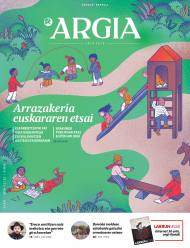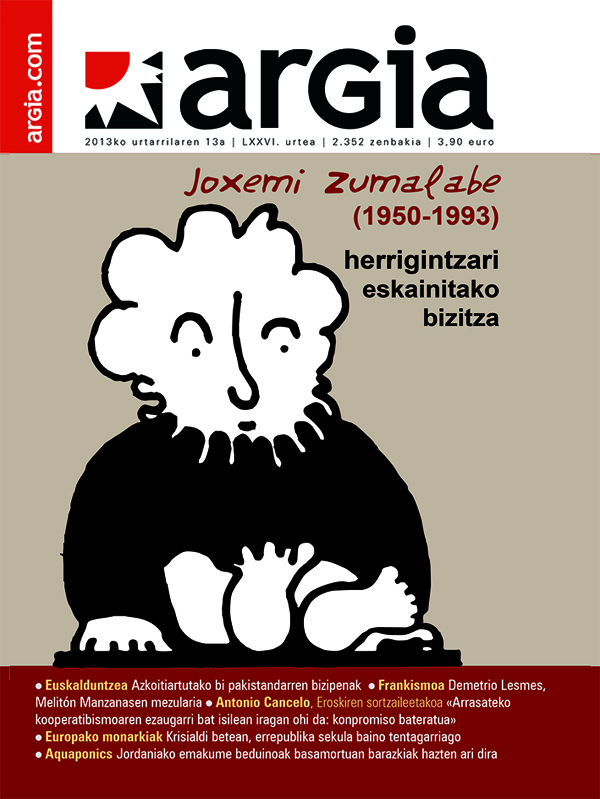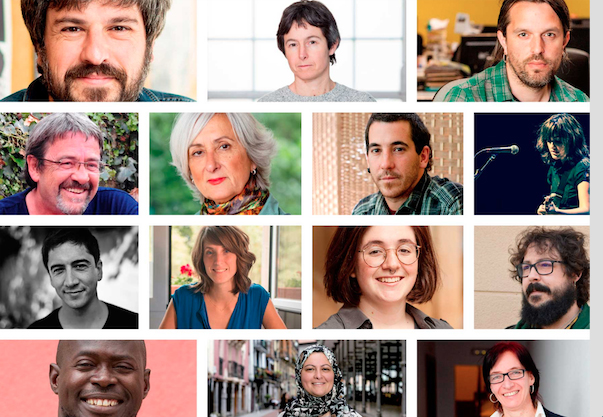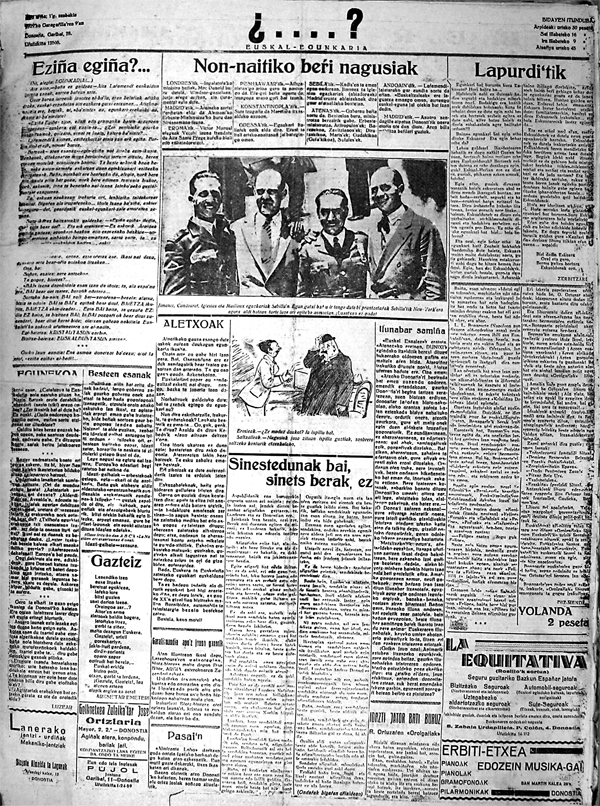Centenario 3 presents: one to the people, another to ARGIA, the largest to Euskal Herria
- This round year has given us a gift to the people of Argia, to the Basque Country and to the communication project. Do we open them?

The Centenary has given people experiences to strengthen the heart: the community that supports this means of communication has gathered around the festival and has felt the warmth of that fire that unites us. ARGIA has carried out twenty-two activities throughout the Basque Country in cooperation with ten actors: The centenary started in Pamplona, knowing the history of the Basque Country in the capital of Navarre, on 12 October the great festival was held in Donostia under the motto Deskolonizezen gaitezen, and has spent the last day in Duzunaritze tied to the land. The last of the activities took place in December at the Durango Fair, where ARGIA has dynamized the round tables of the "Plaza de la Reflexion".
.jpg)
The Centenary has given pieces of historical memory to Euskal Herria: this weekly has brought numerically a fragment of the history of the independent media in Euskera in the Community section, and has distributed weekly a historical cover converted into a sheet. We are not neutral in his book about the character and basis of the current ARGIA. And this year ARGIA has digitized the treasure of 100 years, all the articles and photographs of Zeruko Argia and ARGIA, witnesses of the history of this people. The aim of ARGIA is to make all these digitalized texts and photos available to all citizens as soon as possible, i.e. available on the ARGIA website, on a free licence.
The Centenary
has brought new partners to the communication project: we are now more people, and therefore three more workers in the writing: one who makes videos and one for the first time a writer from Álava and Baja Navarra.Con the accelerated heart, the awareness of its origin and personality and the incorporation of its members to the whole of the Basque Country, ARGIA faces the next century.

We have become masters of the past
We started the year 100 with a special weekly of a hundred pages and you have in your hands another weekly that has closed the centennial cycle. Of course, you can't write a 100-year project, made as a team and based on the involvement of thousands of ciudadanos.Cada people has their experiences, memories and explanations. But by refusing to write a unique and restrictive story, we have taken advantage of the anniversary to recover the numbers of the history of this independent media in Basque: from week to week Miren Osa Galdona has brought us 48 passages of history in the Community section. Together with the Weekly we have received at home an elegant sheet: Selected 45 covers of Zeruko Argia and ARGIA, illustrated with the comments of Koldo Izagirre. If you want to recover the articles of Osa and the texts of Izagirre, it is easier to go to the Internet: All of them are available on the 100 Urte channel and all the information published about the centenary: recorded in video, we will find them in the Multimedia channel of ARGIA (in the events and tertulias sections).
In view of the oppression suffered by the Basque Country in these hundred years, the special achievement is that a media popular in Basque has turned a hundred years. The Capuchins who set up Zeruko Argia have reached the end of the century above the repressions they could have expressed through the "miracle", but the current work team has felt the need to reflect on the keys to the duration and the way we have in ARGIA to understand journalism and work since 1980. Above all, they will also serve us in the day-to-day battle of survival in the next century. All these keys have been picked up by Gorka Bereziartua in his book Ez gara neutralak, with a sharp eye and a thin hand. This book has been distributed to the houses along with the weekly: Because it is an achievement of all people that the independent media in Basque has reached the age of one hundred years and we are all aware of the history and character of ARGIA. In the documentary Ehun urte Soka dantza, Hiru Damatxo has gathered the history of ARGIA and Subai hill and zu kontalari, in the collection of bertsos.

A treasure 100 years within reach of everyone and all
It is not a joke that for three decades we have felt at the headquarters of Argia in Lasarte: if the Oria River next to us will overflow and water enter? The archive made up of thousands of photos and thousands of numbers of Zeruko Argia and Argia have been uploaded to the upper floor a few years ago, for this fear. But what if the residence were set on fire?
We have reason to sleep calmer: The Department of Culture of the Basque Government has scanned the ARGIA photographic archive and all the texts of these hundred years, all of them in digital format, both in ARGIA and in the meeting points of the public institutions. The aim of ARGIA is to make this historic disaster available to all citizens on the ARGIA website as soon as possible. ARGIA has put all the material for free, as it is a ruin of this town, but she has no money to pay for the work that requires putting all these files on the internet. We hope that the path undertaken this year with the Basque Government in digitalisation will continue in the coming years, until everything is made available on the ARGIA website.
CENTENARY ACTS THROUGHOUT THE YEAR: PARTY TO OUR WAY
ARGIA has organised twenty-two activities throughout the year. They have been a great opportunity to meet different towns of Euskal Herria and to take the streets of the cities in Euskera. They have been of all kinds: talks and round tables, hobbies, guided routes, meals, musical and poetic performances, film screening, reading, book fair...Journalism in
Euskera has been the main theme in some of these acts, while in others they have revolved around themes that ARGIA works in daily life: for example, feminism and workers’ struggles, the situation of Basque agriculture
These events have been carried out in collaboration with local actors: Elkar-Ekin Association, Manu Robles Arangiz Institute, Arrasate Euskaldun Dezagun, Mintzalasai elkartea, Hala Bedi irratia, Baltsan elkartea, Akelarre elkatea, Gerediaga elkartea, EHKOlektiboa and Biharelko Lurra.
The actions have been small and medium-sized, with an approximate capacity of 20 people, the largest of three thousand people and many of them 80 people. In each of them people have come together who have different relationships with Argia: people who have been in the Argia for some time, people who have come to the community and who have listened to ARGIA but do not know it. On the street, the themes, people, associations and peoples that a communication project connects with its activity have been crossed.
ARGIA has received the financial contribution of the following entities for the organization of events: Basque Government, Government of Navarra, Diputación Foral de Gipuzkoa, Diputación Foral de Bizkaia, Instituto Vasco de la Cultura, Ayuntamiento de Donostia-San Sebastián and Laboral Kutxa.
We will continue to gather the community on the street in the year 101. For example, the next edition of the Ziburu Book and Record Fair, which this year has been held for the first time, will be attended by Baltsan Elkartea and ARGIA.
Acts of the centenary
In February in Pamplona passing the day: Journey to the origin of the Capuchin convent.
In March in Azpeitia Talk Fascism today and here.
Round table in March Struggles of Surveillance Workers in Bilbao.En April
in Arrasate Language Rights, of whom? Mesa redonda.En
April in Vitoria-Gasteiz talk about the Catalan process and the victory lessons. In
May, on the Leurtza de Urroz reservoir, a guided tour looking for amphibians and reptiles.
In May in Donostia-San Sebastian the Zero to Earth cycle:
Challenge talk to the children's world of the 20th century.
One hundred years, hundreds of imá
genes.Si the instep is not free the recital.
Intrahistory Talk of Journalism in Basque Country.
In June in Hendaya X. In
June I. Book Fair and Disco Vasco de Ziburu.
In September at the winery with the collaborators of Eskuernagan ARGIA pasatiempo. A
round table on the Basque Country in Iparralde will be held in Baiona in September following the establishment of the Commonwealth of Iparralde.
In October at Hernani talk Fascism today and here.
In October, screening of the trilogy of Napardeath films in the square of Donostia.En
October in Donostia let us decolonize the festival of the whole daya.En November, in the 100-year landscape of Duzunaritz, 111
steps throughout the days.
Round tables in December at the Plaza de la Reflexion at the Durango Fair:
We are the Basque press: in Basque and not in bilingual.
... and I give free ear to the people... Free licenses in cultural sectors.
Culture is a job. Talk about professionalization.
The Basque language as a language of integration. What are the new Basque people saying?
All that has been said so far and the actions that we have organized people to people are those that we have done specifically in relation to the Centenary. But there are many other achievements that have materialised this year. What has brought us the laziness, fortune or impulse of this century, we can read below:

Better lying
In previous years ARGIA has progressed gradually in the horizontalization of its work organization and decision-making spaces and has begun this special year taking the most spectacular and symbolic step: to be a means of communication without a director. The new direction, which will be rotational, has also been renewed this year. But ARGIA does not sleep on this issue, because the most horizontal practice possible requires constant work.
We have achieved a dream: ensuring territoriality in the team
ARGIA is a media of Euskal Herria that aims to inform all Basque citizens about the issues of the whole of Euskal Herria. It will end the year making a big leap along that road: The editor will have six of the seven territories. Zigor Oleaga de Álava and Jenofa Berhokoirigoin de Baja Navarra are the two members who have joined the group and will certainly bring news, points of view, sources, characters, collaborators and agents of these territories to the communication project.
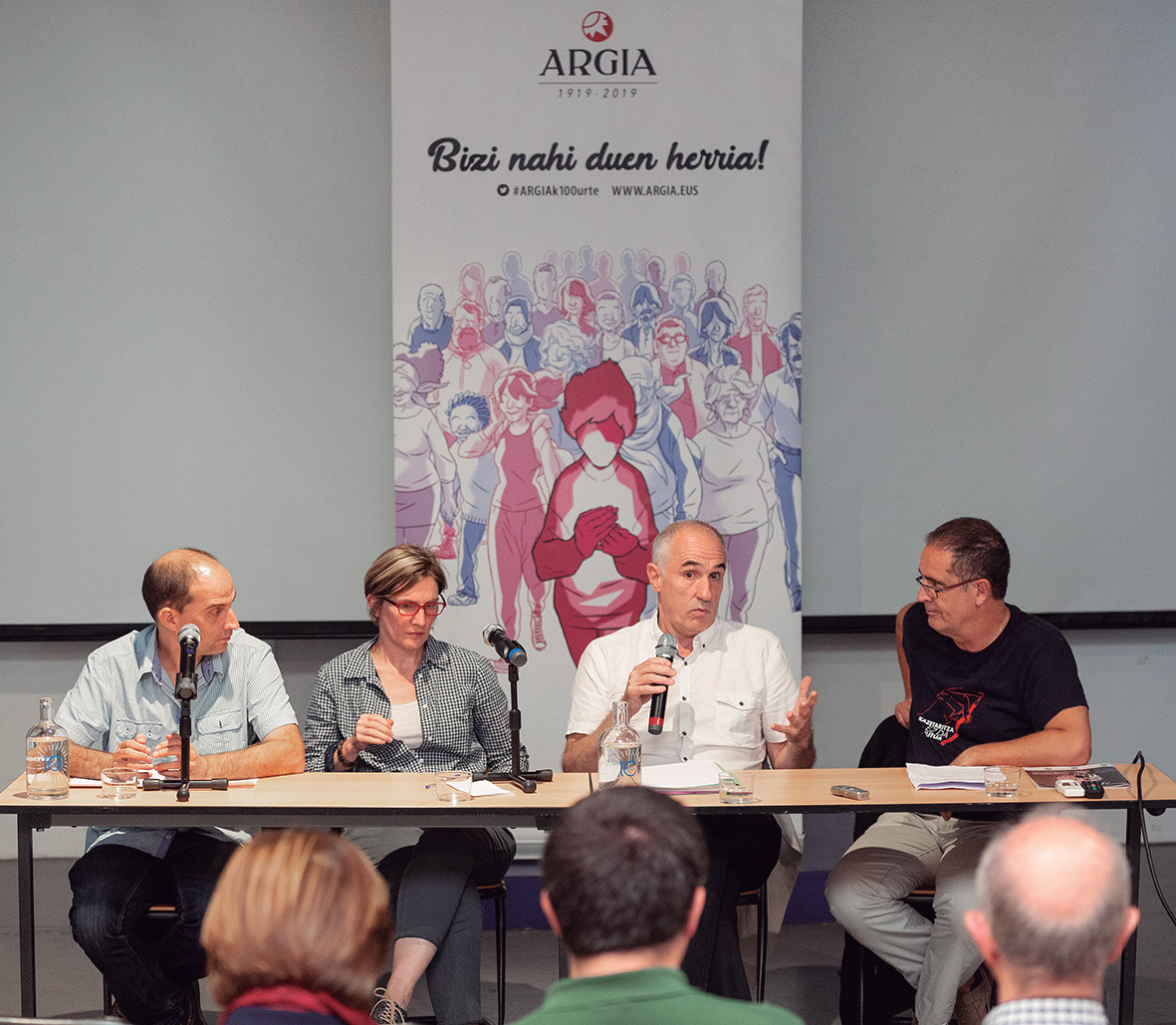
Dexterity in videos
Eneritz Arzallus joined the group earlier this year to strengthen the video industry and thanks to his work, among others, you can see powerful news videos of pil-pil, round-table events of well-documented centenarians, or Internet radio pickups that are offered weekly.
First year after the potato and not so soon
You've already gotten used to this design, but we released it for this special year. Designer Maitane Gartziandia, who joined the working group, this year has renewed the ARGIA logo, the weekly design, the monographic Larrun and the volume of Gakoa journalism that we have distributed this summer.
Those of us who received ARGIA at home will remember this year because the printing press Antza has managed to remove the cursed shipping plastic and pick it up in a compostable potato bag. Every year there will be 200,000 less plastic cases in the Basque Country.

Standing up for repression
ARGIA has once again spread the message that journalism is not a crime. The two Ertzainas have filed a complaint against journalist Lander Arbelaitz for having been denounced by the Ertzaintza for a violation of language rights committed by the Ertzaintza to a citizen. The journalist, who has had to testify in court, has not transcended anything that has happened so far. We will continue to defend the right to information on the street.
More paper fruits
It has been a very fruitful year in the new books and games that have been published, a sign that the team is strong. Onintza Irureta published the book Berdea da more berria in February, reporting the strike of workers in the residences of Bizkaia, and that same year he translated the book into two other languages (Spanish and Catalan).
Mikel García, for his part, will interview Pape Niang. In the book "A New Beginning", Niange has described the path of Senegal to reach and live in the Basque Country, giving voice to the experiences of the migrants.
Jakoba Errekondo published Article 1.111 this year, of which 111 articles have been chosen by 22 personalities from different areas of Basque culture. The result, a book with 111 sheets and pages of special design.
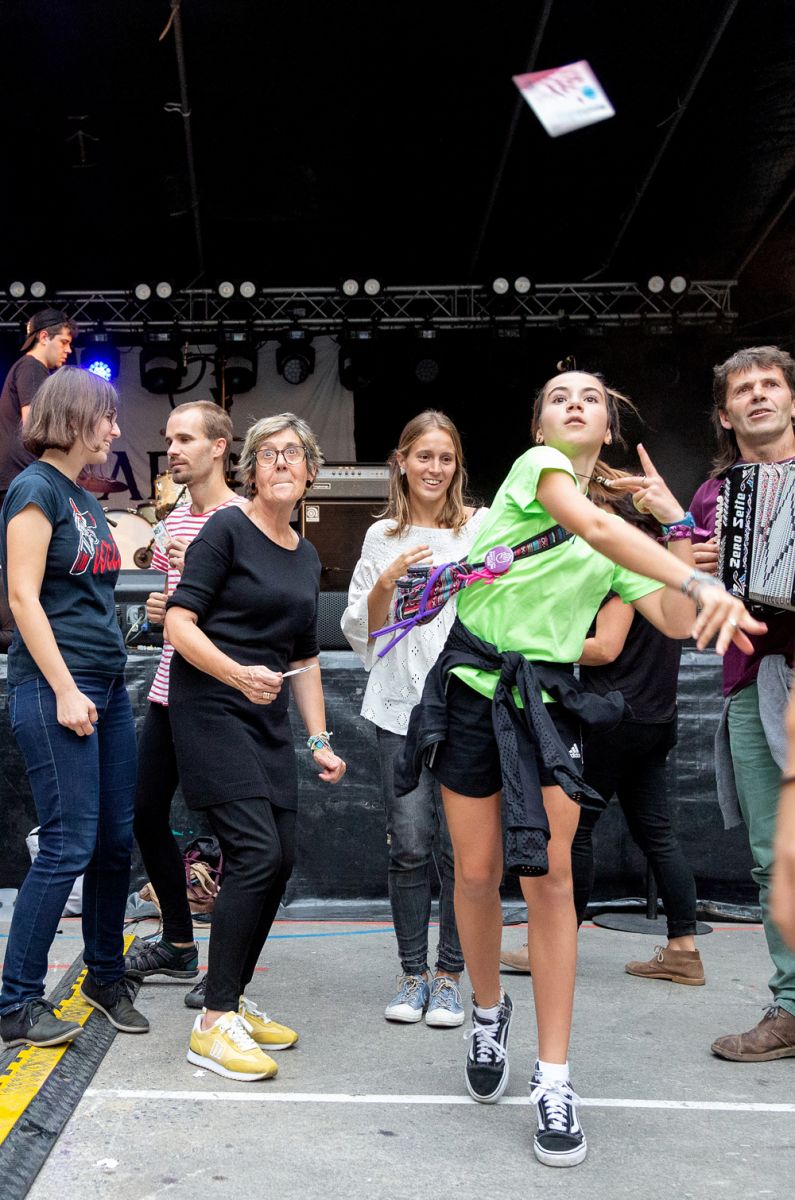
ARGIA has also published a card game in Xapoketa, with the aim of completing our knowledge of the animals of the Basque Country: The contents have been elaborated by biologist Iñaki Sanz, the drawings have been made by Eñaut Aiartzaguren and UPV professor Lore Erriondo has worked on the pedagogical approach.
ARGIA has strengthened its role relationship with Basque political prisoners, with the aim of overcoming linguistic dispersion. This year, the independent media have proposed to receive the Weekly, and hundreds of letters of dread have been received from prisons.
These and more have brought us 2019. We kicked off with the impulse of a year that has been as round as it is round.
2019 has been a special year for ARGIA, an example of this is this number that you have in your hands. Turning a hundred years is not an easy achievement, even more so for a small media outlet in Basque. The celebrations have taken different forms throughout this year and, as... [+]
On the day of the presentation of book 111 Hostoz eta Orriz we had the opportunity to learn about the culture of Duzunaritz. A delicious day to round off a series of celebrations that fill the century of Argia. I can't imagine a more beautiful path than to dirty the shoes in... [+]







